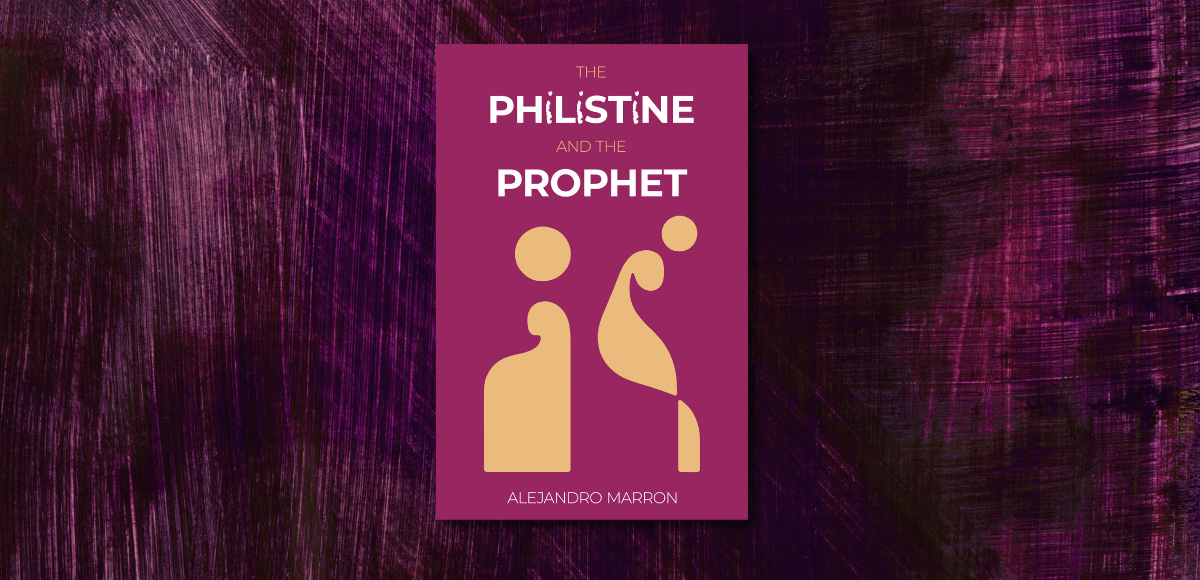
The Philistine and the Prophet
by Alejandro Marron
Genre: Short Story Collection
ISBN: 9798891327856
Print Length: 218 pages
Publisher: Atmosphere Press
Reviewed by John M. Murray
A ragged, razor-sharp collage of vignettes that skewers performative outrage, colonial legacies, and the modern hunger for validation
The Philistine and the Prophet is presented as a two-sided record, each side made up of compact, self-contained pieces, blending satire, reportage, and confession. The narrator is an ironic, self-aware aspiring writer who drifts through bars, airports, conflict zones, and domestic rooms while cataloguing hypocrisy and private shame. Marron intentionally fractures narrative into short sketches so tone, repetition, and juxtaposition carry the book’s argument and affect. The tracklist format invites sampling and return visits so motifs reverberate across the volume.
The first half mercilessly lampoons vanity, influencer culture, and the theatre of public outrage. Sharp sketches such as “Passport to Validation” expose travel as a prop and social approval as a hollow currency, while barroom set pieces show how moral posturing substitutes for responsibility.
As the book progresses, satire yields to sorrow: later vignettes dwell on veterans’ aftermaths, rubble, and private grief, so the collection balances mockery with the actual human costs that mockery risks trivializing. Momentum comes from tonal contrast and accumulation rather than a single linear plot.
Marron’s chief accomplishment is voice. The narrator can pivot from rough mockery to candid vulnerability within a single paragraph, which lets brief pieces carry surprising emotional force. Particular standouts include the barroom debates that interrogate faith and hubris, catalogue passages that force moral accounting, and focused sketches that make single moments feel consequential. The short-form architecture keeps the pace taut while recurring images and refrains create an emergent arc that rewards attentive reading. Cultural references function as pressure points rather than mere name-dropping, which sharpens the book’s moral aim.
The book’s relentlessness is both a blessing and a curse. Frequent profanity and extended invective are deliberate tactics, but repetition can desensitize and blunt impact over the long run. Several tender moments—an older writer’s decline and small acts of contrition—would have benefited from quieter development instead of immediate return to irony. Readers who prefer tidy resolutions or extended character arcs should approach the collage form prepared for provocation rather than consolation. The vignettes almost demand to be read aloud with a friend and argued over with the debate helping to locate sincerity amid satire. Its finest moments sting because they compel a reply now.
The Philistine and the Prophet is combustible, messy, and frequently exhilarating. It will reward readers who want satire that refuses to be polite and a voice willing to bruise. Marron offers no tidy consolations with his closing bonus track reading as both instruction and lament while insisting that awareness without engagement is vanity.
Read this book if you want to be provoked into thought and into action. The vignettes will bruise complacency and reward readers who respond. This is not comfortable reading but might be necessary reading for anyone who cares about complicity today.
Thank you for reading John M. Murray’s book review of The Philistine and the Prophet by Alejandro Marron! If you liked what you read, please spend some more time with us at the links below.


0 comments on “Book Review: The Philistine and the Prophet”